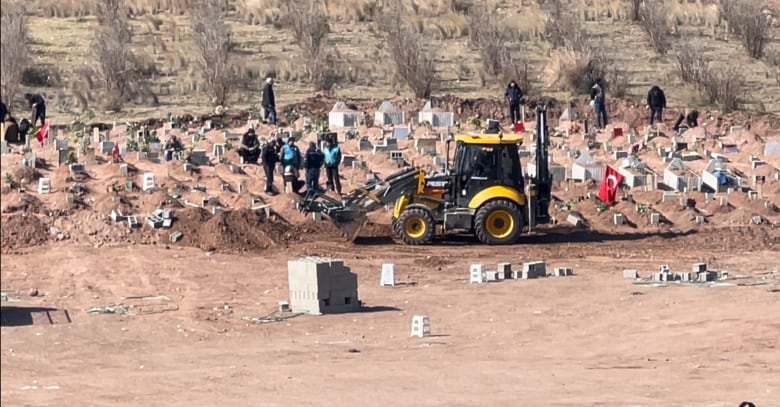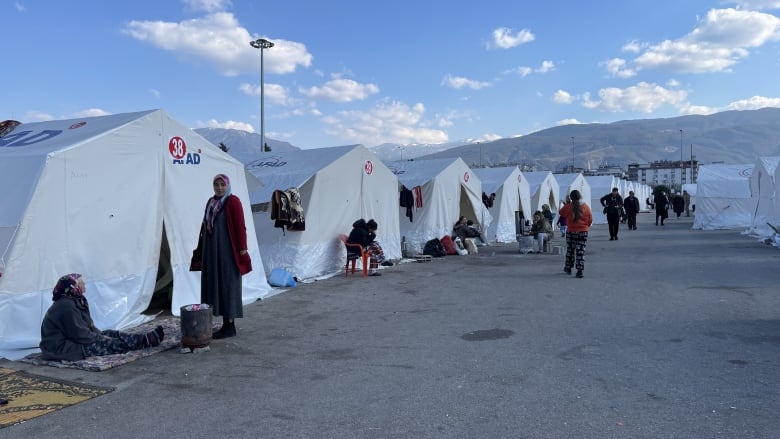For a lot of the previous week, the frantic work of rescuing individuals from the particles of Turkey’s earthquake appeared nearly delicate at occasions, with volunteers typically sifting by ruined buildings utilizing solely their fingers and shovels.
However within the southern metropolis of Osmaniye, that routine ended this weekend.
As a substitute, within the historic central core, the place maybe 800 or extra individuals died in collapsed constructions, backhoes and large industrial-sized diggers are utilizing their huge scoops to pour particles into dump vans and haul it away.
Gone are the quiet pauses to cease and pay attention for indicators of life from under.
Turkey’s post-earthquake response has entered a brand new, grim and certain a lot angrier section, the place discovering and burying the useless is the precedence.
A number of blocks away, on the metropolis’s freshly expanded cemetery, there’s an nearly assembly-line effectivity to the job. A number of white tents with gurneys inside are tended by masked volunteers in white hazmat fits and lengthy aprons.

Beneath Islamic custom, the our bodies are faraway from the coffin and washed by volunteers earlier than being buried and wrapped in a shroud or blanket.
An unlimited pile of disused coffins — probably a number of hundred — are left within the parking zone, put aside to be reused to deliver extra our bodies to the makeshift mortuary.
CBC Information was requested to not speak to households or volunteers on the web site, in order to not make their grief worse.
We have been allowed, nevertheless, to stroll by the cemetery, the place we noticed a newly ready area, stuffed with numerous recent graves and a backhoe piling filth over the newly buried.
Survivors face difficult months forward
By the terrible requirements of final Monday’s twin earthquakes in southern Turkey and northern Syria, Osmaniye escaped the sort of catastrophic injury that nearly annihilated such cities as Antakya and Kahramanmaras.
Nonetheless, the survivors now face lengthy and troublesome months forward.

Subsequent to the Masal amusement park, a number of presidency and non-government organizations have arrange a aid centre with a whole lot of tents and stalls, and volunteers providing sizzling meals.
“Individuals are filled with concern,” stated an administrator, who did not wish to be named as he was unauthorized to talk to overseas journalists.
It is the sort of concern that comes with having your every day routine completely dismantled and your whole assist methods disintegrated, he defined.

He stated some households are settling in for what might be months on the camp, whereas others plan to remain solely lengthy sufficient to make preparations to dwell with members of the family in different cities.
“I hope nobody else on the earth ever has to witness such a catastrophe,” stated Ibrahim Ergen, who till the earthquake hit labored at a neighborhood Osmaniye restaurant as a driver delivering meals.
“The restaurant is now underneath the rubble. I might want to attempt to discover one other job, so let’s examine,” he stated.
A number of males on the humanitarian centre stated they plan to stay round as a result of they imagine the federal government of President Recep Tayyip Erdogan will rapidly launch a rebuilding marketing campaign and that they’re going to get some sort of work in development.
Destruction in Antakya
Not less than in Osmaniye, it is doable to ponder buildings being repaired and companies reopening.
Nonetheless, in different components of the earthquake zone that CBC Information visited over the previous week, it is laborious to think about a rebuilding effort starting quickly, if ever.
In Antakya, the capital of Hatay province close to the border with Syria, it appeared as if nearly each constructing within the metropolis suffered important injury — and virtually each construction within the metropolis centre was both unlivable or had collapsed utterly.
On Ataturk Avenue, condo block after condo block toppled over sideways, falling on one another and triggering a series response like a row of toppling dominoes.
With lots of these 12-storey buildings now pancaked into three or 4 metres of pulverized concrete, nobody could ever know the way many individuals have been asleep inside when the quake hit and have been killed.
“It is tragic,” volunteer Evrim Çakir stated as she struggled to maintain her composure whereas co-ordinating meals and shelter for individuals at a camp on Antakya’s riverbank.
“Mates and family of each individual you see listed here are underneath the rubble,” she stated, motioning to the a whole lot of individuals on the camp who right away grew to become homeless.
She stated what worries her probably the most is the town’s sanitary state of affairs — and particularly the affect that is having on the psychological well being of girls.
“Now we have no moveable bathrooms, and current ones are unusable,” Çakir stated.
“Ladies cry whereas asking for underwear or sanitary pads — having to ask [a stranger] turns it into one thing traumatic.”

Additionally providing assist on the humanitarian centre is Dr. Metin Budak, who practised medication for 39 years in Antakya, earlier than the quake destroyed his clinic and killed lots of his workers members.
Like virtually everybody CBC Information spoke to within the metropolis, Budak has been sleeping outdoors or in his automotive for the previous week.
“Individuals are in deep shock,” he stated, including that he worries the anguish — and anger — of survivors is about to get a lot worse.
“The actual psychological collapse will come after the shock wears off,” he stated.
When Budak was requested about his personal state of affairs — and the destiny of the workers at his clinic — he stated he could not speak about it and wiped tears from his eyes.
‘I’ve seen issues I want I may unsee’
Simply across the nook from the tents on the riverbank, as many as 100 rescuers, together with a group from Bosnia, have been persevering with to make decided efforts to free dozens of people that have been believed to be inside a 12-storey condo constructing when it collapsed.
Amongst them was Ozgur Kesici’s mom, who spoke to CBC Information as he watched the rescue try.
“Now I do not really feel something,” he stated of watching his childhood dwelling crumble and the neighbourhood he grew up in smashed into items.
“I’ve seen issues I want I may unsee. I felt issues I want I may un-feel. I simply do not feel something in the meanwhile.”
Kesici stated his mom was dwelling alone within the condo, and though there was no signal of her, searchers discovered a few of her belongings — together with a bottle of Heineken beer, engraved together with his title on it, that he stored at her dwelling.
Additionally they discovered a number of images of mom and son collectively that she had apparently put up on a wall.
Kesici had been working in a finance job in Germany and returned to Antakya after the earthquake.
The worst, he stated, is that he cannot complain about his loss to individuals he is aware of within the metropolis as a result of they’re coping with their very own grief.
“Half the neighbourhood, perhaps greater than that, is simply powdered. Whoever I’m speaking to, my mates, my childhood mates or anybody else, everybody has their very own ache.”
Not like in Osmaniye, the place toughing it out for a number of months could also be an possibility, that is probably not doable in Antakya. Too many fundamental providers are gone.
The only predominant freeway out of the town has been jammed with visitors for days, with an exodus of individuals attempting to get out.
Budak, the physician on the riverbank humanitarian centre, stated he feels as if Antakya’s 2,000 years as a thriving place of commerce and tradition could also be over.
“I am afraid it’ll turn into a sort of ghost metropolis.”
